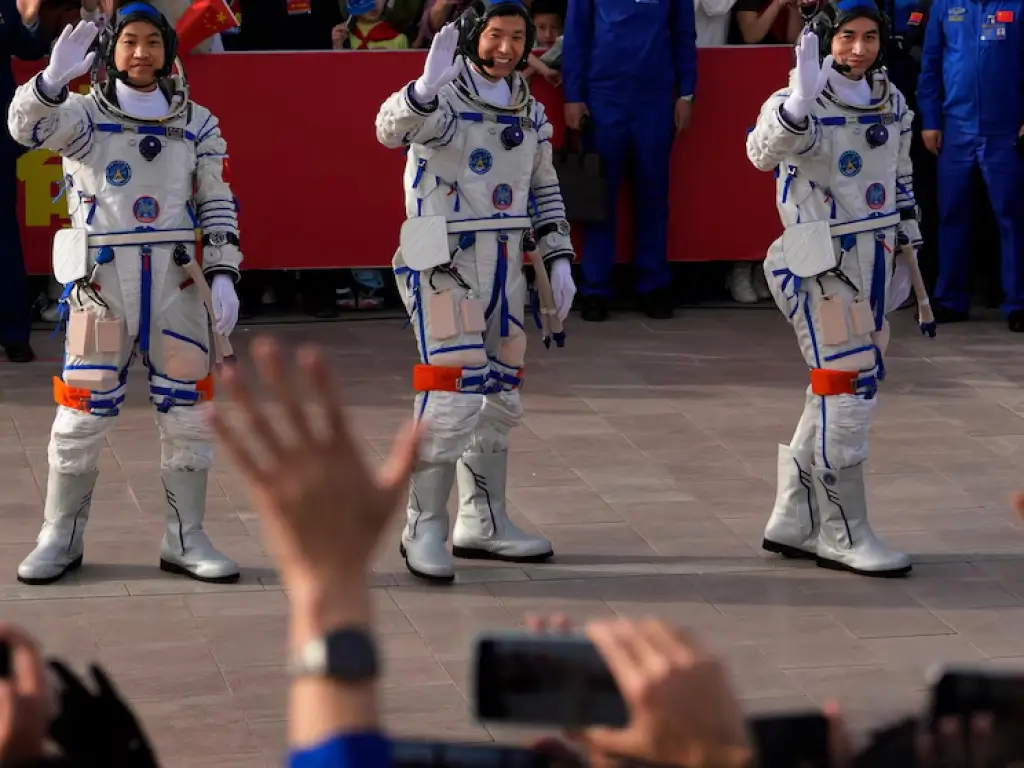Three Chinese astronauts returned to the base early on Monday after having completed their 6-month mission on the orbital Tiangong space station; this demonstrates China’s intent to become one of the most powerful forces in space. This mission can now be added to China’s portfolio of recent space accomplishments such as the lunar sample return, Mars exploration, and other plans that aim to confirm China as a world power in space research within the next several years.
Their return capsule, assisted by parachutes, landed in the quiet, remote plains of Inner Mongolia around 1:24 a.m. local time. When the crew came out of the capsule, they were welcomed by a Chinese national flag planted beside the capsule, with the flag swaying in the cool night breeze. The successful conclusion of their mission proved that China is gaining experience in organizing long manned space flights, which can be considered an important step in achieving the goal of developing long-term space exploration.
For the last few years, China has been building up its space program as a contender in space exploration. Over the past few years, the nation has achieved historic milestones that present its innovative proficiency and planning horizon. Three years ago, China made history by becoming the third country in the world to get samples from the moon, following the United States and the former Soviet Union. In the coming months, China’s Zhurong rover touched down on the red planet, extending the country’s experience beyond the Earth’s orbit.
Looking forward, China has its sights set on another milestone: robotic exploration of Mars, for the Chinese, is, in addition, to landing Chinese astronauts on the moon before the year 2030. This meant that it was to become the second country, next only to the United States, to send a manned lunar mission in its space program. A lunar mission of this kind is not just about science but also about asserting China as a new contender in the space race, a place it wants to cultivate in the next several decades.
Tiangong, which means ‘Heavenly Palace‘, is China’s space station, which forms the core of the space program. China’s Tiangong space station, operational since 2022…, Tiangong orbits Earth and is expected to continuously exchange its crew by six months every time for scientific research, spacewalks, and other maintenance. The station’s completion liberation of China as the third country after the United States and Russia to have its own space station vital for China’s next lunar and deep space goals.
The three astronauts who will return to Earth relieved a similarly manned crew that joined Tiangong only the week before. This new team one woman and two men will take over Tiangong’s maintenance, repair, and research work, spacewalks, and installation of necessary equipment to the station, which is protection from increasing space debris. The change is the third such crew exchange since the station was launched to show China’s willingness to keep a long-term mission in orbit.
The subject of space littoral has gained more importance in recent years because China and other countries are venturing more into space. Some of these challenges have, however, been witnessed in Tiangong itself. China Daily quoted a Chinese space agency report that Tiangong had changed its position several times last year to avoid pieces of space debris. For example, once a fragment of debris hit and damaged part of the solar wing’s power cables, thereby prevented power supply for some time.
China has also come under pressure over its generation of space debris, especially after the mid-August launch of eighteen small satellites to provide global Internet service. This was reminiscent of SpaceX’s Starlink launch plan, which led to the explosion of a rocket stage in orbit, adding more debris to orbit around Earth.
Up to the present, only the Chinese astronauts have been privileged to visit the Tiangong space station. However, sources say China is negotiating with other nations to train their astronauts and launch them to the station to signify its desire to form partnerships in space. One Chinese astronaut agency declared in a recent statement that there are plans for selecting and preparing foreign astronauts who may fly in space with Chinese crew-mates to Tiangong, opening the possibilities of conjunction in crewed expeditions to the station.
The idea of overseas participation stands out for two reasons, not least of which is that Chinese astronauts are prohibited from participating in the ISS project to a significant extent due to the United States’ objections to the use of military technology in China’s space program. By opening up the space station for foreign astronauts, China could expand its sphere of influence and provide a research facility in space that could entice nations currently participating in the ISS as it comes close to the end of its useful life in the coming decade.
Most recently, China announced its strategic plan towards realizing a comprehensive space power by the middle of the 21st century, 2050 to be precise. This strategic plan matches up with the achievements of the organization up to date and encompasses space station operations, deep-space endeavors, lunar stations, as well as collaboration in space research. This speaks of the 2050 target, as China aims not only to make parity with established spacefaring nations but also intends to chart new ways and possibly lead in terms of space innovation and study. China has its sights set on another milestone: landing Chinese astronauts on the moon by 2030…
For China, each successful mission, especially, the return of these astronauts safely indicates China’s earnest engagement in space exploration. With China seeking to invest in space development and relevant technologies, space science and exploration is going to have itself a potent competitor.
The arrival of these three astronauts back to Earth from Tiangong is therefore a sign of China’s continuing journey in space. As China proposes more lunar missions along with multinational astronauts and a vision for 2050 and beyond, China is on a tight track to becoming one of the premiere spacefaring nations. The achievements and goals represent a new phase of the space race, and China’s “Tian Gong” is rising in space.










